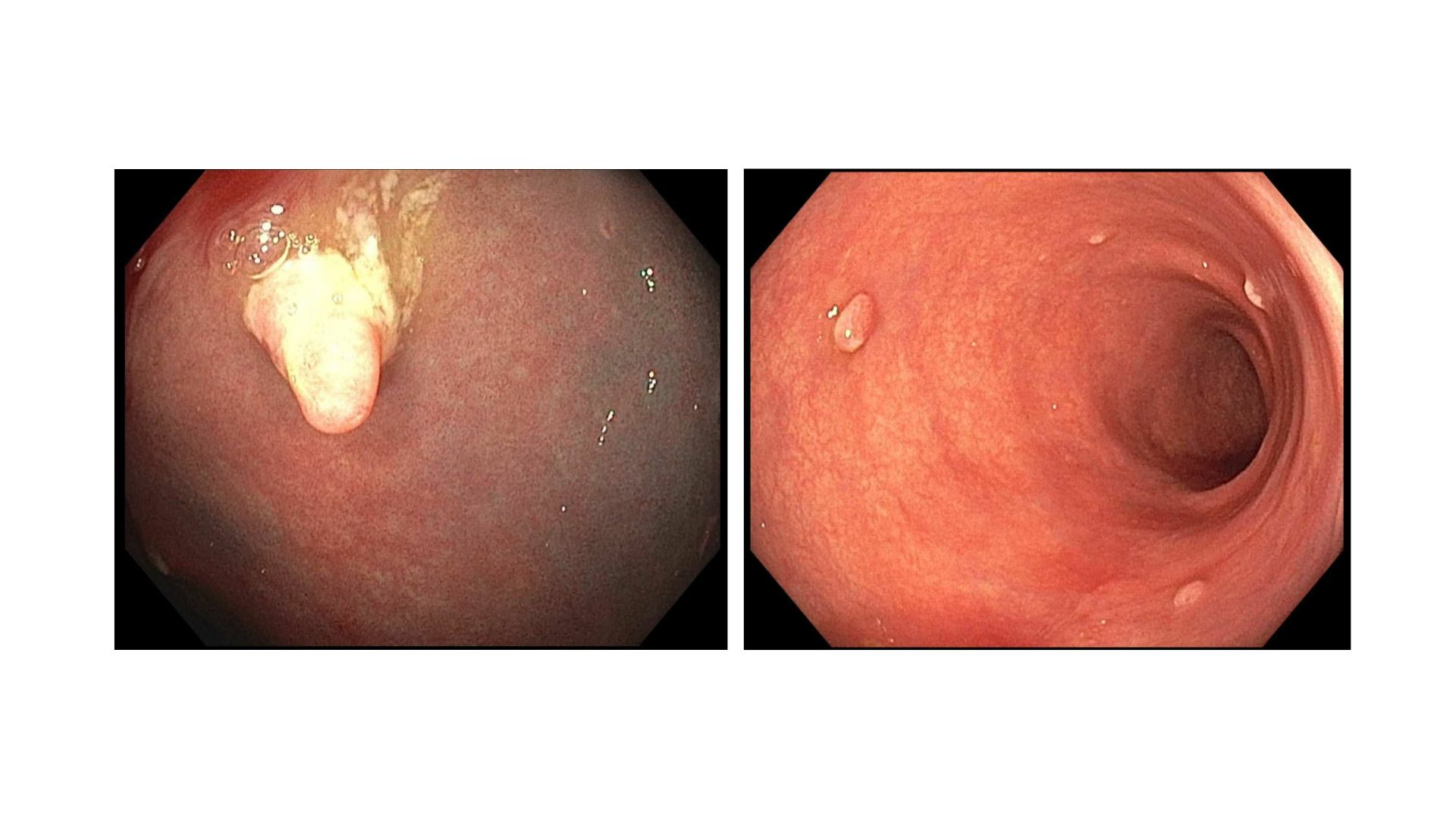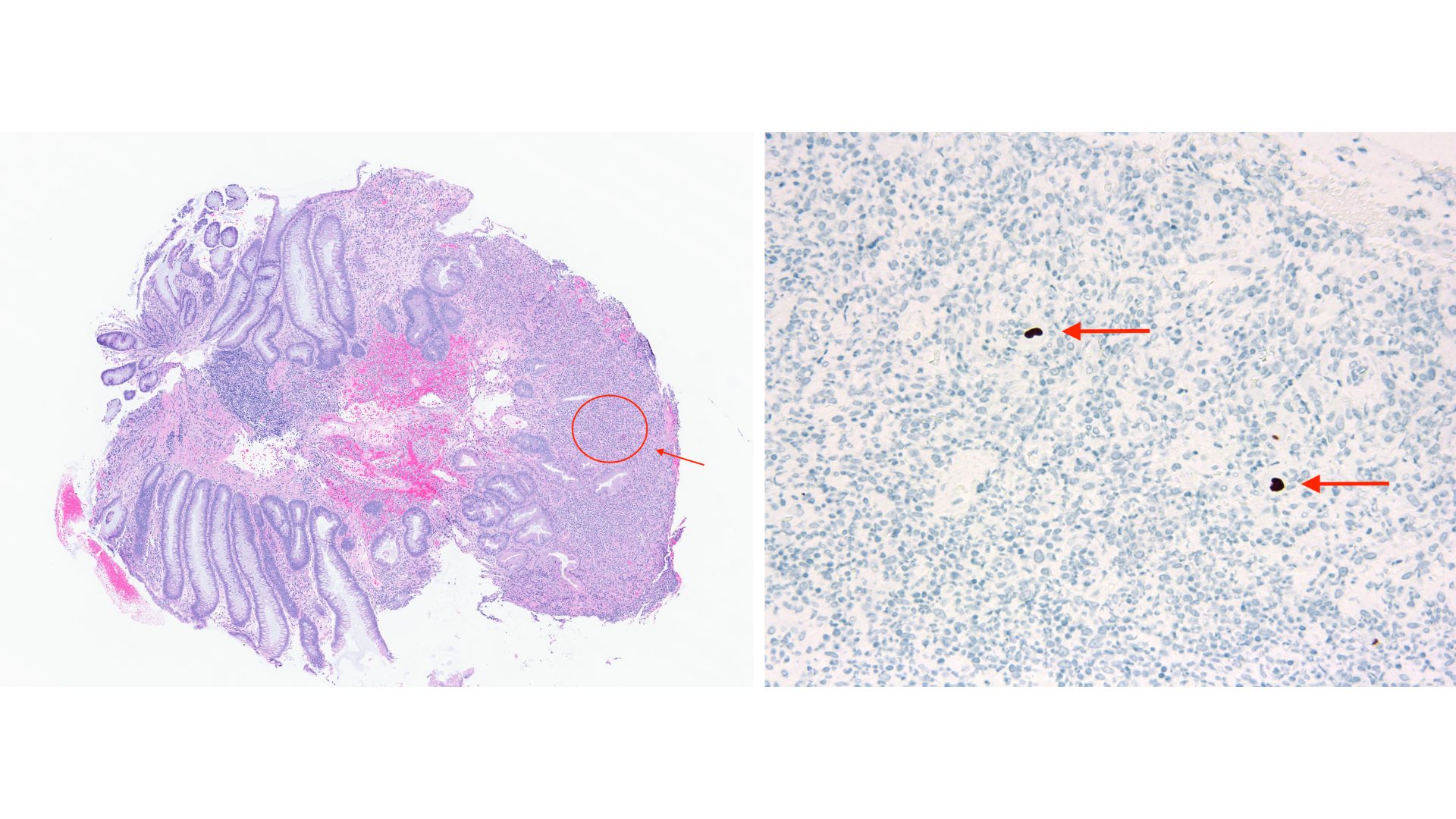Monday Poster Session
Category: Infections and Microbiome
P3473 - CMV Colitis Presenting as Inflammatory Polyposis in a Patient With Common Variable Immunodeficiency
Monday, October 27, 2025
10:30 AM - 4:00 PM PDT
Location: Exhibit Hall

Kendall Johnson, MD
University of California Davis Health Graduate Medical Education
Sacramento, CA
Presenting Author(s)
Kendall Johnson, MD1, Karen Matsukuma, MD, PhD1, Cecilia Terrado, MD1, Jeffrey Ko, MD2
1University of California Davis Health Graduate Medical Education, Sacramento, CA; 2UC Davis Health, Sacramento, CA
Introduction: Common Variable Immunodeficiency (CVID) is a genetic disorder characterized by decreased immunoglobulin levels, predisposing individuals to recurrent infections. The gastrointestinal tract is a common site of involvement, with manifestations ranging from infectious colitis to, in rare cases, inflammatory polyposis. Cytomegalovirus (CMV) colitis, primarily seen in immunocompromised hosts, has rarely been associated with inflammatory polyps. We present an unusual case of a middle-aged female with CVID who developed CMV colitis with numerous inflammatory polyps, requiring intravenous antiviral therapy after oral treatment failure.
Case Description/
Methods: A 45-year-old female with CVID, interstitial lung disease, pulmonary hypertension, and chronic hypoxemic respiratory failure presented with several months of 15-20 episodes of bloody diarrhea daily and microcytic anemia. A colonoscopy at an outside facility revealed inflammatory polyps, with biopsies showing CMV inclusions. She was not treated for CMV at that time. Repeat colonoscopy months later revealed numerous inflammatory polyps throughout the colon. Pathology again showed CMV inclusions consistent with CMV colitis.
She was referred to Infectious Disease and started on oral valganciclovir. After five days, she experienced worsening diarrhea (30-50 times/day) and weight loss. She was advised to go to the ED, where labs showed elevated ESR (57 mm/hr), CRP (2.5 mg/dL), CMV viral load (75.6 IU/mL), and CMV DNA (899 IU/mL). She was admitted and treated with four days of IV ganciclovir, resulting in significant symptom improvement. She was discharged on oral valganciclovir for three weeks. CMV DNA became undetectable after one week of treatment and has remained negative since.
Discussion: In immunocompromised patients like those with CVID, CMV can cause significant GI disease, including ulceration, diarrhea, hematochezia, and, rarely, inflammatory polyps. Oral valganciclovir is the standard treatment for CMV and typically is as efficacious as IV ganciclovir. However, in patients with significant GI involvement, mucosal damage may impair absorption. This patient’s severe diarrhea, weight loss, and lack of response to oral therapy indicated a component of malabsorption. IV ganciclovir, which bypasses the gut, led to clinical improvement and viral clearance. This case underscores the importance of early recognition and appropriate parenteral treatment in immunocompromised patients with CMV colitis and suspected malabsorption.

Figure: Figure 1: Left: Single raised inflammatory polyp seen on colonoscopy. Right: Multiple sessile inflammatory polyps.

Figure: Figure 2: Left: H&E stain of inflammatory polyp, highlighting area of granulation tissue and dense chronic inflammation. Right: Scattered CMV inclusions present in stromal and endothelial cells (identified by immunohistochemistry).
Disclosures:
Kendall Johnson indicated no relevant financial relationships.
Karen Matsukuma indicated no relevant financial relationships.
Cecilia Terrado indicated no relevant financial relationships.
Jeffrey Ko indicated no relevant financial relationships.
Kendall Johnson, MD1, Karen Matsukuma, MD, PhD1, Cecilia Terrado, MD1, Jeffrey Ko, MD2. P3473 - CMV Colitis Presenting as Inflammatory Polyposis in a Patient With Common Variable Immunodeficiency, ACG 2025 Annual Scientific Meeting Abstracts. Phoenix, AZ: American College of Gastroenterology.
1University of California Davis Health Graduate Medical Education, Sacramento, CA; 2UC Davis Health, Sacramento, CA
Introduction: Common Variable Immunodeficiency (CVID) is a genetic disorder characterized by decreased immunoglobulin levels, predisposing individuals to recurrent infections. The gastrointestinal tract is a common site of involvement, with manifestations ranging from infectious colitis to, in rare cases, inflammatory polyposis. Cytomegalovirus (CMV) colitis, primarily seen in immunocompromised hosts, has rarely been associated with inflammatory polyps. We present an unusual case of a middle-aged female with CVID who developed CMV colitis with numerous inflammatory polyps, requiring intravenous antiviral therapy after oral treatment failure.
Case Description/
Methods: A 45-year-old female with CVID, interstitial lung disease, pulmonary hypertension, and chronic hypoxemic respiratory failure presented with several months of 15-20 episodes of bloody diarrhea daily and microcytic anemia. A colonoscopy at an outside facility revealed inflammatory polyps, with biopsies showing CMV inclusions. She was not treated for CMV at that time. Repeat colonoscopy months later revealed numerous inflammatory polyps throughout the colon. Pathology again showed CMV inclusions consistent with CMV colitis.
She was referred to Infectious Disease and started on oral valganciclovir. After five days, she experienced worsening diarrhea (30-50 times/day) and weight loss. She was advised to go to the ED, where labs showed elevated ESR (57 mm/hr), CRP (2.5 mg/dL), CMV viral load (75.6 IU/mL), and CMV DNA (899 IU/mL). She was admitted and treated with four days of IV ganciclovir, resulting in significant symptom improvement. She was discharged on oral valganciclovir for three weeks. CMV DNA became undetectable after one week of treatment and has remained negative since.
Discussion: In immunocompromised patients like those with CVID, CMV can cause significant GI disease, including ulceration, diarrhea, hematochezia, and, rarely, inflammatory polyps. Oral valganciclovir is the standard treatment for CMV and typically is as efficacious as IV ganciclovir. However, in patients with significant GI involvement, mucosal damage may impair absorption. This patient’s severe diarrhea, weight loss, and lack of response to oral therapy indicated a component of malabsorption. IV ganciclovir, which bypasses the gut, led to clinical improvement and viral clearance. This case underscores the importance of early recognition and appropriate parenteral treatment in immunocompromised patients with CMV colitis and suspected malabsorption.

Figure: Figure 1: Left: Single raised inflammatory polyp seen on colonoscopy. Right: Multiple sessile inflammatory polyps.

Figure: Figure 2: Left: H&E stain of inflammatory polyp, highlighting area of granulation tissue and dense chronic inflammation. Right: Scattered CMV inclusions present in stromal and endothelial cells (identified by immunohistochemistry).
Disclosures:
Kendall Johnson indicated no relevant financial relationships.
Karen Matsukuma indicated no relevant financial relationships.
Cecilia Terrado indicated no relevant financial relationships.
Jeffrey Ko indicated no relevant financial relationships.
Kendall Johnson, MD1, Karen Matsukuma, MD, PhD1, Cecilia Terrado, MD1, Jeffrey Ko, MD2. P3473 - CMV Colitis Presenting as Inflammatory Polyposis in a Patient With Common Variable Immunodeficiency, ACG 2025 Annual Scientific Meeting Abstracts. Phoenix, AZ: American College of Gastroenterology.
